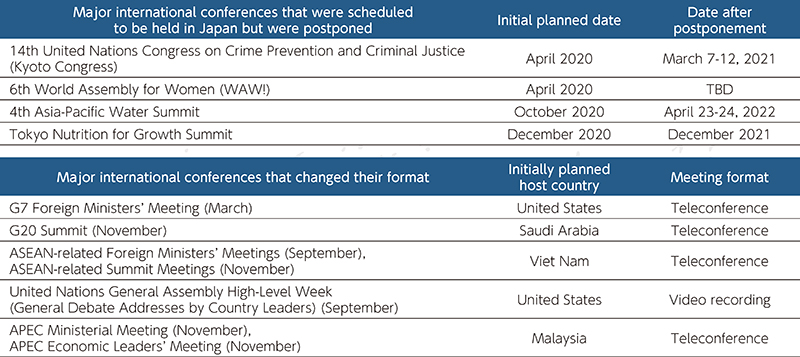Diplomatic Bluebook 2021
Opening Spetial Features
Responses to the Novel Coronavirus Disease (COVID-19)
In 2020, the international community faced an unprecedented crisis: the spread of the novel coronavirus disease (COVID-19) and severe economic downturn. This crisis, which arose in the midst of rising protectionism and growing inward-looking trends in the world, cannot be tackled by any single country alone, and served to reaffirm the importance of multilateralism. On the other hand, it brought into question once again the functions and neutrality of international organizations, including the World Health Organization (WHO).
Against this backdrop, Japan has taken various domestic measures to prevent the spread of infection while maintaining the level of socioeconomic activities. Overseas, Japan has worked to protect Japanese nationals at risk, supported developing countries with weak medical systems, and called for international solidarity, treating the spread of COVID-19 as a human security crisis that threatens people's lives, livelihoods and dignity across the world.
1 Outbreak and Spread of COVID-19 and Impact on the International Community
Since the end of 2019, COVID-19 has spread from China to the rest of the world and evolved into a global pandemic. The epicenter of infections shifted to Italy and other European countries in March 2020. COVID-19 spread in the U.S. from April and in emerging economies, and developing countries, including India, Brazil and South Africa, from June to August. From September onwards, infections were somewhat contained in many countries including East Asia, while the U.S. and Europe saw a resurgence.
As of the end of January 2021, the number of cases in the world exceeded approximately 102.32 million (approximately 380,000 in Japan) and the number of deaths exceeded approximately 2.21 million (approximately 5,600 in Japan).
Since December 2020, the spread of variants that are thought to be more infectious has been reported in Africa, Latin America, Europe including the UK, as well as Japan. In the same month, a newly developed vaccine against COVID-19 began to be administered in Europe and the U.S. In Japan, vaccination rollout commenced in February 2021 for priority groups, including healthcare workers.
On the economic front, amidst lockdowns and stay-at-home orders in countries, demand fell sharply and supply chain disruptions caused supply constraints, resulting in a rapid contraction in the global flow of people and goods. As a result, the real gross domestic product (GDP) growth rate in 2020 dropped to historic lows in all major countries and regions (-3.5% in the U.S., -6.8% in the Eurozone, and -4.8% in Japan year-on-year). COVID-19 has also considerably changed the social lives of the people in the respective countries. Due to lockdowns and stay-at-home orders, substantial progress was made in digital transformation, including remote working and online classes.
In addition, COVID-19 imposed significant restrictions on the diplomatic activities of each country. To prevent the spread of the disease, most international meetings and conferences, including the United Nations (UN) General Assembly, had to be postponed or changed to an online format. Reciprocal visits by leaders and foreign ministers were also severely restricted. No overseas visits were made by the Japanese Prime Minister after Prime Minister Abe Shinzo's visit to the Middle East in January 2020 until Prime Minister Suga Yoshihide's visit to Southeast Asia in October. Foreign Minister Motegi Toshimitsu did not have an opportunity for overseas visits after his visit to Germany in February until his visit to the UK in August. Under such circumstances, diplomatic activities were carried out via video conferences and telephone calls. Since the outbreak of COVID-19 until December 2020, video conferences and telephone calls were conducted by Prime Minister Abe over 40 times, Prime Minister Suga over 30 times, and Foreign Minister Motegi over 110 times. Foreign Minister Motegi resumed overseas visits starting with the visit to the UK in August. With thorough safety measures in place, Foreign Minister Motegi visited 23 countries by January 2021, including Europe, Southeast Asia, the Middle East, Africa, and Latin America.
Changes in the number of newly infected people by country and region (7-day average)
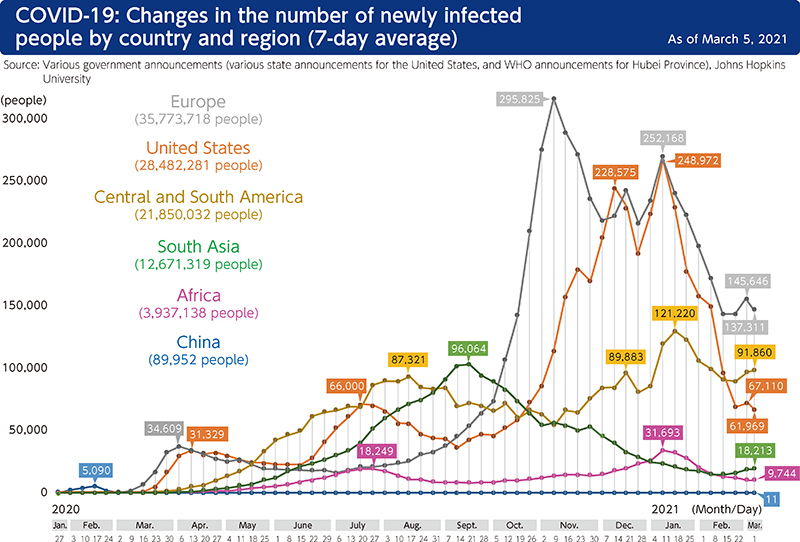
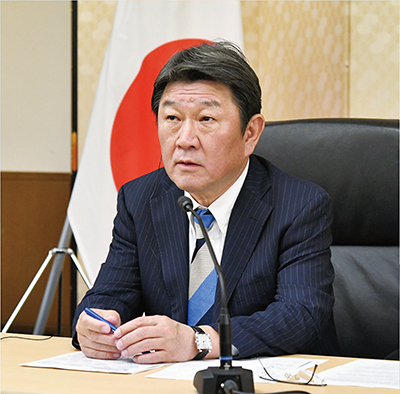
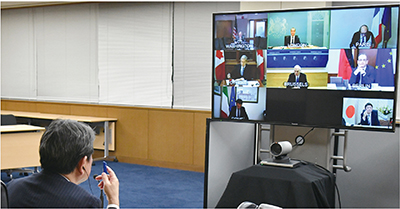 G7 Foreign Ministers' Meeting held via video conference for the first time (March 26)
G7 Foreign Ministers' Meeting held via video conference for the first time (March 26)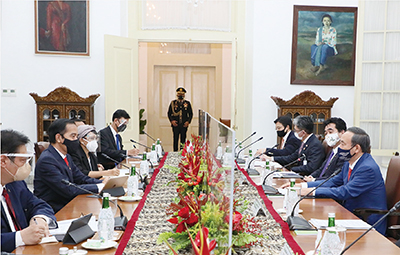 Japan-Indonesia Summit Meeting held with masks on and barriers installed (October 20, Indonesia; Photo: Cabinet Public Relations Office)
Japan-Indonesia Summit Meeting held with masks on and barriers installed (October 20, Indonesia; Photo: Cabinet Public Relations Office)Major international conferences that were postponed or changed their format
